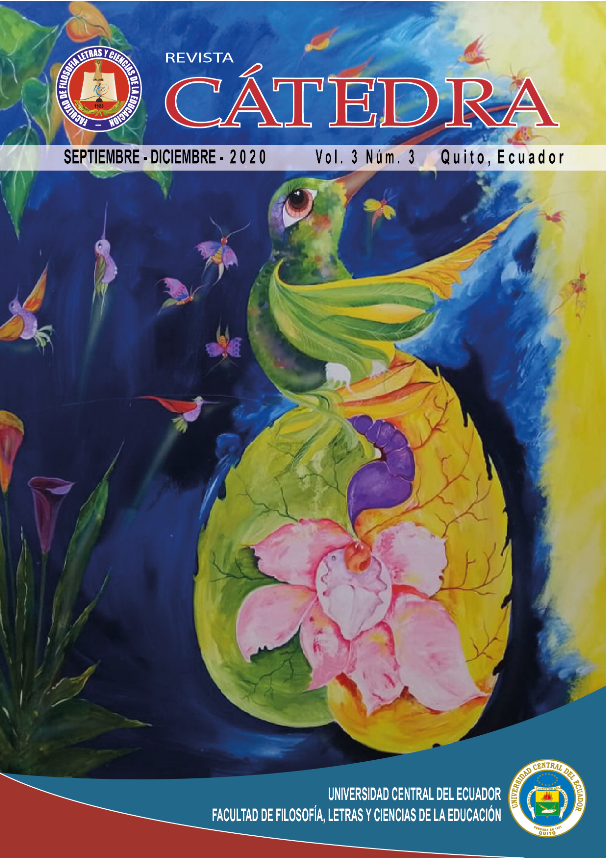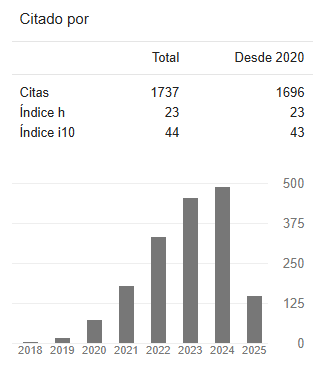Participatory research and action: a methodological tool for the understanding and transformation of university practice
DOI:
https://doi.org/10.29166/catedra.v3i3.2187Keywords:
Educational research, participatory action research, methodology, educational practice, systematizationAbstract
This research focuses on the study of the Participatory Action Research (PAR) methodology as part of the academic training of students in the Early Education Career. There is no evidence of studies that support the application of the I-AP at a higher level, therefore, it is an objective of this research to determine whether the I-AP is a methodology that improves the educational practice of students in the Early Childhood Education Career at the Technical University of Machala (UTMCH), given that this methodology today is giving the educational community answers that are aimed at solving the problems that arise in the research. Within its application, two important processes are combined in the classroom, that of knowing and that of acting, involving students in both. Like other participatory approaches, this one provides communities with a method to analyze and better understand the reality of the population, its problems, needs, capacities and resources; and, it allows them to plan actions and measures to transform and improve it. A descriptive, non-experimental research design with a qualitative approach was applied. Subsequently, a descriptive analysis was made of the information collected through a semi-structured interview of seven open questions. The results obtained showed a greater interest and expectation of what will be taught in the subject of Participatory Research and Action: Lesson Study within the Career as part of their academic training.
Downloads
References
Balcázar, F. E. (2003). Investigación acción participativa (IAP): Aspectos conceptuales y dificultades de implementación. Fundamentos en humanidades, 7-8, 59-77. https://dialnet.unirioja.es/servlet/articulo?codigo=1272956
Balcázar, F. E., y Hernández, B. (2002). Violencia y discapacidad: Un modelo de intervención basado en la investigación-acción participativa. Psychosocial Intervention, 11(2).
Barba-Martín, R. A., Barba, J. J., y Martínez Scott, S. (2015). La formación continua colaborativa a través de la investigación-acción. Una forma de cambiar las prácticas de aula. Contextos Educativos. Revista de Educación, 0(19), 161-175. https://doi.org/10.18172/con.2769
Cáceres, M., García, R., y Sánchez, L. (2002). Dificultades metodológicas y condiciones organizativas durante el desarrollo de un proceso de investigación-acción. Revista Digital de Educación y Nuevas Tecnologías Contexto Educativo, 4(22).
Carr, W., & Kemmis, S. (2003). Becoming critical: Education knowledge and action research. Routledge.
Castañeda, J. (2013). Investigación de Acción Participativa. https://es.slideshare.net/joselyn091/accion-participativa1?next_slideshow=2
Colmenares, A. M. (2012). Investigación-acción participativa: Una metodología integradora del conocimiento y la acción. Voces y Silencios. Revista Latinoamericana de Educación, 3(1), 102–115.
Figueroa Sandoval, B., Aillon Neumann, M., Herrera Chandía, J., Yáñez Monje, V., & Palavecino Bustos, M. (2012). « El estudio de aprendizaje», un modelo para el desarrollo del conocimiento pedagógico. Estudios pedagógicos (Valdivia), 38(2), 55–68.
Kolb, D. A. (1984). Experience as the source of learning and development. Upper Sadle River: Prentice Hall.
Latorre, A. (2003). Investigación acción. Graó.
Lewin, K. (1946). Action research and minority problems. Journal of social issues, 2(4), 34–46.
Molina Olavarría, Y. (2015). Necesidades educativas especiales, elementos para una propuesta de inclusión educativa a través de la investigación acción participativa: El caso de la Escuela México. Estudios pedagógicos (Valdivia), 41(ESPECIAL), 147-167. https://doi.org/10.4067/S0718-07052015000300010
Pereyra, M. (2008). La investigación acción en educación. Ministerio de cultura y educación de la nación, 112–118.
Pérez Gómez, Á. I., y Soto Gómez, E. (2011). Lesson study: La mejora de la práctica y la investigación docente. Cuadernos de pedagogía, 417, 64–67.
Revelo Rosero, J. E., Revuelta Domínguez, F. I., & González-Pérez, A. (2018). Modelo de integración de la competencia digital del docente universitario para su desarrollo profesional en la enseñanza de la matemática – Universidad Tecnológica Equinoccial de Ecuador. EDMETIC, 7(1), 196-224. https://doi.org/10.21071/edmetic.v7i1.6910
Rivas Tovar, L. A. (2011). Las nueve competencias de un investigador. Investigación administrativa, 40(108), 34-54. http://www.scielo.org.mx/scielo.php?script=sci_abstract&pid=S2448-76782011000200034&lng=es&nrm=iso&tlng=es
Soto Gómez, E. S., y Pérez Gómez, Á. I. (2015). Lessons Studies: Un viaje de ida y vuelta recreando el aprendizaje comprensivo. Revista Interuniversitaria de Formación del Profesorado, 84, 15–28.
Downloads
Published
Versions
- 2021-01-07 (2)
- 2020-09-29 (1)









